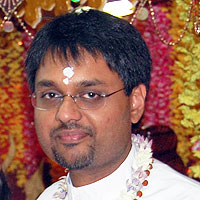Hinduism, also referred to as Sanaatan Dharma, retains its most fundamental principles irrespective of time, place and circumstance. Codified in the scriptures are various poetic verses as well as prose in many different languages written in history, but not in English. These scriptures are subject to interpretation. A formal system was once in place, as interpretation was the responsibility of highly learned saints and sages. However, due to religious dilution and polluting idealisms brought to the fore through time, interpretation seemed the informal responsibility of those who took the opportunity to twist and turn scripture. Interpretation then became subjective. The slightest modification to suit an individual, a body of Hindus/ sect can harbour damaging ramifications and conflict. Some folk etymological meanings were retained; however, corrupted meanings of various words and stories became prominent and rampant, hence, adding to the wrong interpretation of the scriptures.
Languages that have dominated the Hindu scriptures in history, regardless of denomination or differing bodies, are of non-English varieties. This is a problem for the modern Hindu who is predominantly trying to understand and interpret the numerous scriptures in corresponding English translations. It could also be a problem in the attitude of the Hindu to his/her own religion. It is a clarion call to many who write blogs, submit official articles, essays and literature based on their subjective interpretation of the scriptures that they seek the advice and guidance from those who hold considerable influence and understanding of the topic.
Those we speak of are Hindu leaders or pundits, international Hindu bodies who carry the preservation and promotion of this fantastic way of life as their guiding light and purpose. Too many articles are being published that carry misinformation. They lack the depth of the rich philosophy of Hinduism. They harbour misunderstanding and corrupt and conflicting views. They represent elementary mistakes in interpretation and in most cases, the image of Hindu scriptures seem like folktales and superstition.
Hinduism is a highly symbolic religion. Only those who are enlightened on its philosophy can interpret its scriptures. A platform for this interpretation of scriptures in both the language of the scriptures and interpretation (usually in a different language) are done in numerous yagyas and satsangs globally. In understanding a religion like Hinduism and its unique verse in Sanskrit, Hindu, Urdu and so forth, followers must first make sense of their own understanding of the interpretations being given.
This is no overnight solution. That is why we remove emotion and narrow-mindedness when attempting to read the scriptures and understand them. An interpretation will only be produced based on the intellectual capacity and experience of the interpreter. We should be guided by those with experience – the revered, the spiritual, the true guides and leaders. Let them offer us their words and wisdom as tradition has enjoined throughout time.


